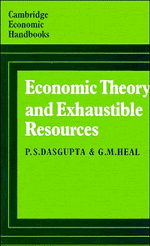Book contents
- Frontmatter
- PREFACE
- Contents
- Chapter 1 A PREVIEW
- Chapter 2 RESOURCE ALLOCATION IN A TIMELESS WORLD
- Chapter 3 EXTERNALITIES
- Chapter 4 INTERTEMPORAL EQUILIBRIUM
- Chapter 5 RENEWABLE RESOURCES: SOME ECOLOGICAL AND ENVIRONMENTAL MODELS
- Chapter 6 EXHAUSTIBLE RESOURCES: AN INTRODUCTION
- Chapter 7 PRODUCTION WITH EXHAUSTIBLE RESOURCES
- Chapter 8 RESOURCE DEPLETION AND CAPITAL ACCUMULATION IN A COMPETITIVE ECONOMY
- Chapter 9 MEASURABILITY, COMPARABILITY AND THE AGGREGATION OF INTERGENERATIONAL WELFARES
- Chapter 10 THE OPTIMAL DEPLETION OF EXHAUSTIBLE RESOURCES
- Chapter 11 IMPERFECT COMPETITION AND EXHAUSTIBLE RESOURCES
- Chapter 12 TAXATION OF EXHAUSTIBLE RESOURCES
- Chapter 13 UNCERTAINTY, INFORMATION AND THE ALLOCATION OF RISK
- Chapter 14 UNCERTAINTY AND THE ALLOCATION OF RESOURCES
- Chapter 15 PRICE MOVEMENTS IN RESOURCE MARKETS
- Chapter 16 CONCLUSIONS
- BIBLIOGRAPHY
- INDEX
Chapter 16 - CONCLUSIONS
Published online by Cambridge University Press: 04 April 2011
- Frontmatter
- PREFACE
- Contents
- Chapter 1 A PREVIEW
- Chapter 2 RESOURCE ALLOCATION IN A TIMELESS WORLD
- Chapter 3 EXTERNALITIES
- Chapter 4 INTERTEMPORAL EQUILIBRIUM
- Chapter 5 RENEWABLE RESOURCES: SOME ECOLOGICAL AND ENVIRONMENTAL MODELS
- Chapter 6 EXHAUSTIBLE RESOURCES: AN INTRODUCTION
- Chapter 7 PRODUCTION WITH EXHAUSTIBLE RESOURCES
- Chapter 8 RESOURCE DEPLETION AND CAPITAL ACCUMULATION IN A COMPETITIVE ECONOMY
- Chapter 9 MEASURABILITY, COMPARABILITY AND THE AGGREGATION OF INTERGENERATIONAL WELFARES
- Chapter 10 THE OPTIMAL DEPLETION OF EXHAUSTIBLE RESOURCES
- Chapter 11 IMPERFECT COMPETITION AND EXHAUSTIBLE RESOURCES
- Chapter 12 TAXATION OF EXHAUSTIBLE RESOURCES
- Chapter 13 UNCERTAINTY, INFORMATION AND THE ALLOCATION OF RISK
- Chapter 14 UNCERTAINTY AND THE ALLOCATION OF RESOURCES
- Chapter 15 PRICE MOVEMENTS IN RESOURCE MARKETS
- Chapter 16 CONCLUSIONS
- BIBLIOGRAPHY
- INDEX
Summary
Introduction
One of the most striking aspects of the problems analysed in the foregoing chapters is the intellectual breadth and depth of the issues involved, and this makes conclusions particularly difficult to draw. One is perhaps more conscious of unsolved problems than of clearcut conclusions, and indeed one function of this chapter must be to emphasize the substantial deficiencies that still exist in our understanding. But before doing so let us take stock of some of our major conclusions.
Besides providing a guide for future strategies, this can also give valuable reassurance that problems, which seem impossibly difficult at first sight, may eventually be viewed from an angle which makes their basic structure clear and tractable. Our conclusions in this chapter are offered in this spirit of providing guidance and reassurance rather than attempting to provide categorical and simple answers to the questions we have studied.
Among the problems that have been our concern, at last two can be stated very simply: under what conditions will a market system allocate exhaustible resources in such a manner that the marginal social value of a resource is equal in all uses and constant over time, so that the benefits accruing from its use are maximized? And how should a government construct plans or conduct project evaluation exercises to achieve the same ends?
- Type
- Chapter
- Information
- Economic Theory and Exhaustible Resources , pp. 471 - 480Publisher: Cambridge University PressPrint publication year: 1980



